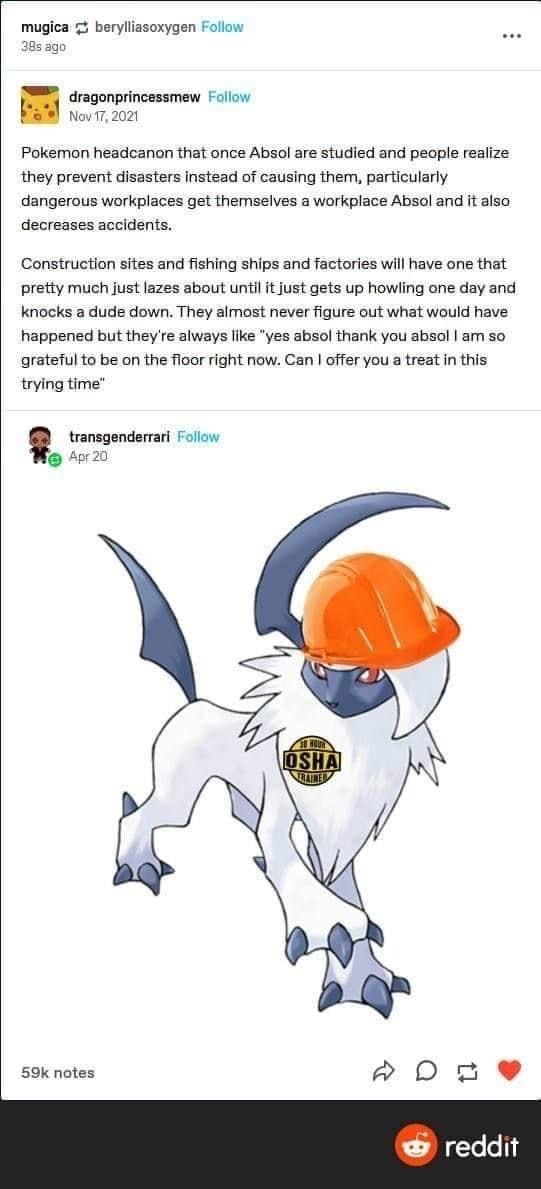#osha safety
Text

His name is Osha and he cares about your work safety
11 notes
·
View notes
Text
Anti-mask policies and decision makers are using the momentum of anti-masking in the context of covid to also prevent people from accessing or using respirators to protect their breathing and lungs from other hazards -- things that were accepted in many industries as standard safety protocols before 2020.
"“During his first week, Complainant started coughing up black phlegm, his throat and tongue would burn, and he began having breathing problems due to excessive smoke and fumes from the cupola. He notified Sturgeon but nothing changed, and he was not provided a respirator.”
After not receiving a respirator, the lawsuit said the man went to the dispensary room and picked up a respirator himself.
He wore the respirator for the next week until the lawsuit said the safety supervisor saw him wearing it and “immediately became very upset; he rudely admonished the Complainant in front of his co-workers for wearing the respirator and demanded that he take it off immediately.”
According to the lawsuit, he told the safety supervisor he did not feel safe doing his job without it and was pulled into a meeting the next day where he was told he would not be allowed to wear a respirator.
...
After the meeting, the complaint said he was assigned to shovel gravel for the day before going home for the weekend at the end of his shift. On Monday, his employment was terminated.
The Occupational Safety and Health Administration (OSHA) opened an investigation into the company after learning of the alleged retaliation, and the DOL said in a statement that OSHA investigators with the Whistleblower’s Protection Program found the company violated federal protections by terminating the employee who exercised their protected rights to request protective equipment."
4K notes
·
View notes
Text
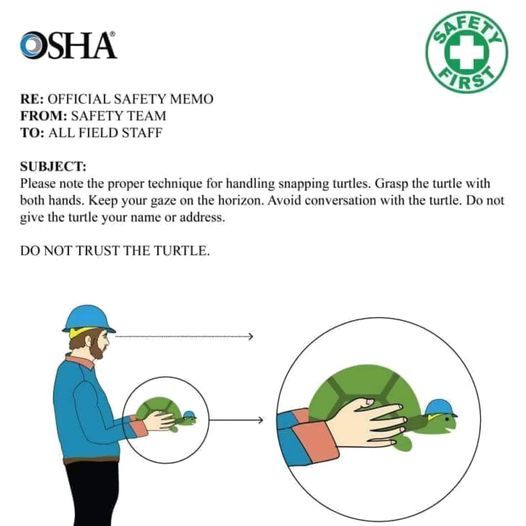
2K notes
·
View notes
Text
American workers are dying, local businesses are reporting a drop in productivity, and the country's economy is losing billions all because of one problem: the heat.
July was the hottest month on record on our planet, according to scientists. This entire summer, so far, has been marked by scorching temperatures for much of the U.S. South, with the thermometer reaching triple digits in several places in Texas between June and July.
In that same period, at least two people died in the state while working under the stifling heat enveloping Texas, a 35-year-old utility lineman, and a 66-year-old USPS carrier. According to the Bureau of Labor Statistics, there were 36 work-related deaths due to environmental heat exposure in 2021, the latest data available. This was a drop from 56 deaths in 2020, and the lowest number since 2017.
"Workers who are exposed to extreme heat or work in hot environments may be at risk of heat stress," Kathleen Conley, a spokesperson for the Centers for Disease Control and Prevention (CDC), told Newsweek. "Heat stress can result in heat stroke, heat exhaustion, heat cramps, or heat rashes. Heat can also increase the risk of injuries in workers as it may result in sweaty palms, fogged-up safety glasses, and dizziness. Burns may also occur as a result of accidental contact with hot surfaces or steam."
While there is a minimum working temperature in the U.S., there's no maximum working temperature set by law at a federal level. The CDC makes recommendations for employers to avoid heat stress in the workplace, but these are not legally binding requirements.
The Biden administration has tasked the Occupational Safety and Health Administration (OSHA) with updating its worker safety policies in light of the extreme heat. But the federal standards could take years to develop—leaving the issue in the hands of individual states.
Things aren't moving nearly as fast as the emergency would require—and it's the politics around the way we look at work, the labor market, and the rights of workers in the U.S. that is slowing things down.
949 notes
·
View notes
Photo
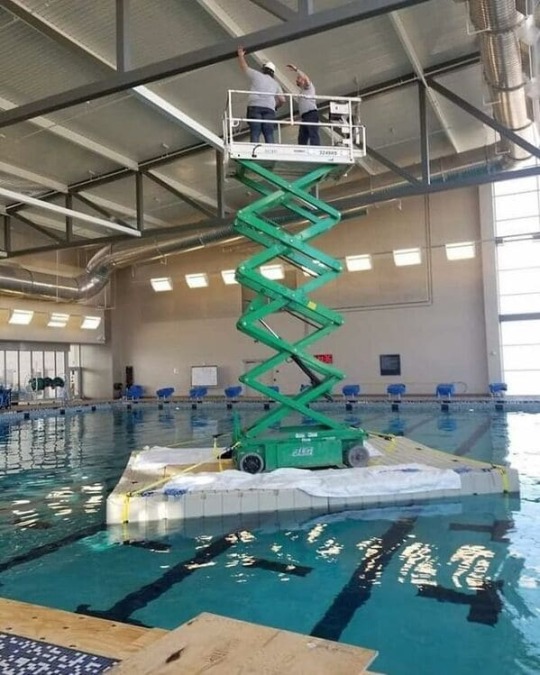
4K notes
·
View notes
Photo
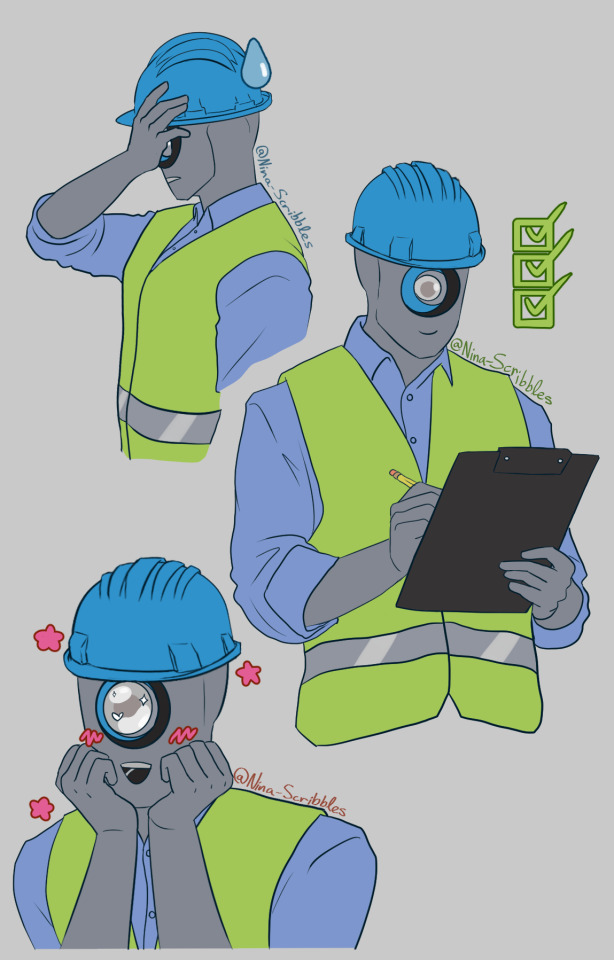
i think the best part of being an artist is being able to create the random dumb garbage that litters my brain, and inflict it on others. So here’s some @osha-official-the-sequel fan-art because their blog makes me laugh :)
#uhhhhh how to even tag this#osha fanart#fanart#osha official#this was oddly good hand practice lol#sexyman-chronicals#the real tumblr sexyman was the safety rules we implemented along the way <3
1K notes
·
View notes
Text
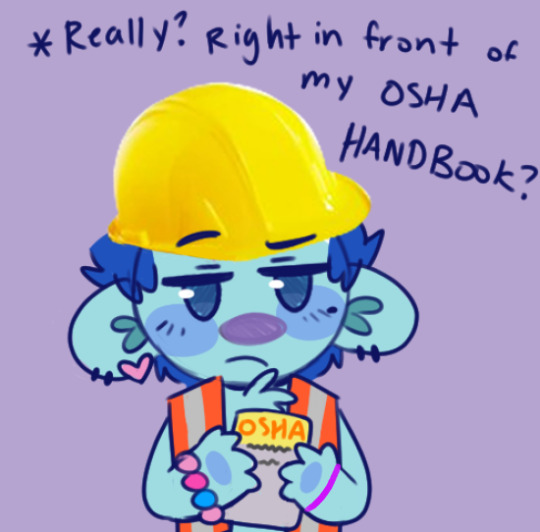
someone put a glitter cannon within a no party cannon zone and started playing patty cake infront of it smh
#dreamworks trolls#branch#branch trolls#my au#safety rules and osha regulations are very important!#doodle#sketch#shitpost#osha
147 notes
·
View notes
Text
Big Train managers earn bonuses for greenlighting unsafe cars
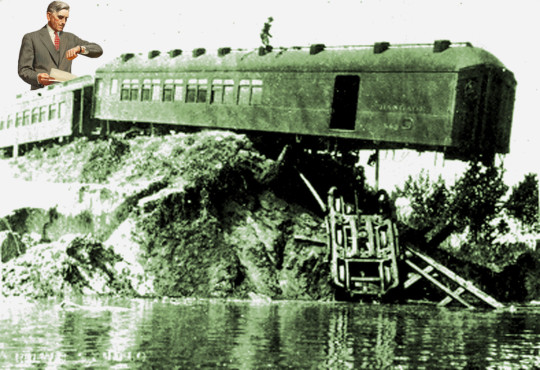
Tomorrow (November 16) I'll be in Stratford, Ontario, appearing onstage with Vass Bednar as part of the CBC IDEAS Festival. I'm also doing an afternoon session for middle-schoolers at the Stratford Public Library.

Almost no one knows this, but last June, a 90-car train got away from its crew in Hernando, MS, rolling three miles through two public crossings, a ghost train that included 47 potentially explosive propane cars. The "bomb train" neither crashed nor derailed, which meant that Grenada Railroad/Gulf & Atantic didn't have to report it.
This is just one of many terrifying near-misses that are increasingly common in America's hyper-concentrated, private equity-dominated rail sector, where unsafe practices dominate and whistleblowers face brutal retaliation for coming forward to regulators.
These unsafe practices – and the corporate policies that deliberately gave rise to them – are documented in terrifying, eye-watering detail in a deeply reported Propublica story by Topher Sanders, Jessica Lussenhop,Dan Schwartz, Danelle Morton and Gabriel L Sandoval:
https://www.propublica.org/article/railroad-safety-union-pacific-csx-bnsf-trains-freight
It's a tale of depraved indifference to public safety, backstopped by worker intimidation. The reporting is centered on railyard maintenance inspectors, who are charged with writing up "bad orders" to prevent unsafe railcars from shipping out. As private equity firms consolidated rail into an ever-dwindling number of companies, these workers face supervisors who are increasingly hostile to these bad orders.
It got so alarming that some staffers started carrying hidden digital recorders, so they could capture audio of their bosses illegally ordering them to greenlight railcars that were too unsafe for use. The article features direct – and alarming – quotes, like supervisor Andrew Letcher, boss of the maintenance crews at Union Pacific's Kansas City yard saying, "If I was an inspector on a train I would probably let some of that nitpicky shit go."
Letcher – and fellow managers for other Tier 1 railroads quoted in the piece – aren't innately hostile to public safety. They are quite frank about why they want inspectors to "let that nitpicky shit go." As Letcher explains, "The first thing that I’m getting questioned about right now, every day, is why we’re over 200 bad orders and what we’re doing to get them down."
In other words, corporate rail owners have ordered their supervisors to reduce the amount of maintenance outages on the rail lines, but have not given them additional preventative maintenance budgets or crew. These supervisors warn their employees that high numbers of bad orders could cost them their jobs, even lead to the shutdown of the car shops where inspectors are prone to pulling dangerous cars out of service.
It's a ruthless form of winnowing. Gresham's Law holds that "bad money drives out good" – in an economy where counterfeit money circulates, people preferentially spend their fake money to get it out of their hands, until all the money in circulation is funny money. This is the rail safety equivalent: simply fire everyone who reports unsafe conditions and all your railcars will be deemed safe, with the worst railcars shipped out first. A market for lemons – except these aren't balky used sedans, they're unsafe railcars full of toxic chemicals or explosive propane.
When cataclysmic rail disasters occur – like this year's East Palestine derailment – the rail industry reassures us that this is an isolated incident, pointing to the system's excellent overall safety record. But that record is a mirage, because the near-misses don't have to be reported. Those near-misses are coming more frequently, as the culture of profit over safety incurs a mounting maintenance debt, filling America's rails with potential "bomb cars."
Rail mergers and other forms of deregulated, anything-goes capitalism are justified by conservative economists who insist that "incentives matter," and that the profit motive provides the incentive to improve efficiency, leading to lower costs and better service. But the incentive to externalize risk, kick the can down the road, and capture regulators rarely concerns the "incentives matter" crowd.
Here's an incentive that matters. Rail managers' bonuses – as much as a fifth of their take home pay – are only paid if the trains they oversee run on time. Inspectors have recorded their managers admitting that they have quotas – a maximum number of bad orders their facility may produce, irrespective of how much unsafe rolling stock passes through the facility.
Inspectors have caught their managers removing repair order tags from cars they've flagged as unsafe. Inspectors will log orders in a database, only to have the record mysteriously deleted, or marked as serviced when no service has occurred. Some inspectors have seen the same cars in their yard with the same problems, and repeatedly flagged them without any maintenance being performed before they're shipped out again.
Former managers from Union Pacific, CSX and Norfolk Southern told Propublica that they operated in an environment where safety reports were discouraged, and that workers who filed these reports were viewed as "complainers." Workers furnished Propublica with recordings of rail managers berating them for reporting persistent unsafe conditions the Federal Railroad Administration. Other workers from BNSF said that they believed that their bosses were told when they called the company's "confidential" work-safety tipline, setting them up for retaliation by bosses who'd falsified safety reports.
Whistleblowers who seek justice at OSHA are stymied by long delays, and while switching their cases to court can win them cash settlements, these do not get recorded on the company's safety record, which allows the company to go on claiming to be a paragon of safety and prudence.
The culture of retaliation is pervasive, which explains how the 47-cars worth of propane on the "bomb train" that rolled unattended over three miles of track never made the news. There is a voluntary Close Call Reporting System (operated by NASA!) where rail companies can report these disasters. Not one of America's Class 1 rail companies participate in it.
After the East Palestine disaster, Transport Secretary Pete Buttigieg pushed the rail companies to join, but a year later, none have. It's part of an overall pattern with Secretary Buttigieg, who has prodigious, far-reaching powers under USC40 Section 41712(a), which allow him to punish companies for "unfair and deceptive" practices or "unfair methods of competition":
https://pluralistic.net/2023/01/10/the-courage-to-govern/#whos-in-charge
Buttigieg can't simply hand down orders under 41712(a) – to wield this power, he must follow administrative procedures, conducting market studies, seeking comment, and proposing a rule. Other members of the Biden administration with similar powers, like FTC chair Lina Khan, arrived in office with a ranked-priority list of bad corporate conduct and immediately set about teeing up rules to give relief to the American public.
By contrast, Buttigieg's agency has done precious little to establish the evidentiary record to punish the worst American companies under its remit. His most-touted achievement was to fine five airlines for saving money by cancelling their flights and stranding their passengers. But of the five airlines affected by Buttigieg's order, four were not US companies. The sole affected US carrier was Spirit airlines, with 2% of the market. The Big Four US airlines – who have a much worse record than the ones that were fined – were not affected at all:
https://prospect.org/infrastructure/transportation/ftc-noncompete-airline-flight-cancellation-buttigieg/
Rather than directly regulating the US transportation sector, Buttigieg prefers exacting nonbinding promises from them (like the Tier 1 rail companies' broken promise to sign up to the Close Call Reporting System). Under his leadership, the Federal Railroad Agency has proposed weakening rail safety standards, rescinding an order to improve the braking systems on undermaintained, mile-long trains carrying potentially deadly freight:
https://pluralistic.net/2023/02/11/dinah-wont-you-blow/#ecp
The US transportation system is accumulating a terrifying safety debt, behind a veil of corporate secrecy. It badly demands direct regulation and close oversight.
If you are interested in rail safety, I strongly recommend this episode of Well There's Your Problem, "a podcast about engineering disasters, with slides" – you will laugh your head off and then never sleep again:
https://www.youtube.com/watch?v=0BMQTdYXaH8

If you'd like an essay-formatted version of this post to read or share, here's a link to it on pluralistic.net, my surveillance-free, ad-free, tracker-free blog:
https://pluralistic.net/2023/11/15/safety-third/#all-the-livelong-day
#pluralistic#safety third#safety#whistleblowers#trains#railroad#rail safety#propublica#east palestine#monopoly#osha#bnsf#csx#bad orders#federal railroad administration#fra#association of american railroads#norfolk southern#union pacific#incentives matter#bomb train#Confidential Close Call Reporting System
159 notes
·
View notes
Text
I love trigun fanart and fanfiction that portray Wolfwood as looking at all the crazy and the weird stuff and the alien nonsense or even just the artists trying to make the twins attractive or whatnot and Wolfwood just being the most normal person there. Just like "i aint paid enough for this."
#trigun stampede#trigun#vash the stampede#vash#nicholas d wolfwood#he aint paid either that's the thing#he ought to be paid#dealing with millions knives should be considered a workplace hazard#or an osha violation#i mean he gets safety equipment#gun and also the serum#no hard hats here though
47 notes
·
View notes
Text
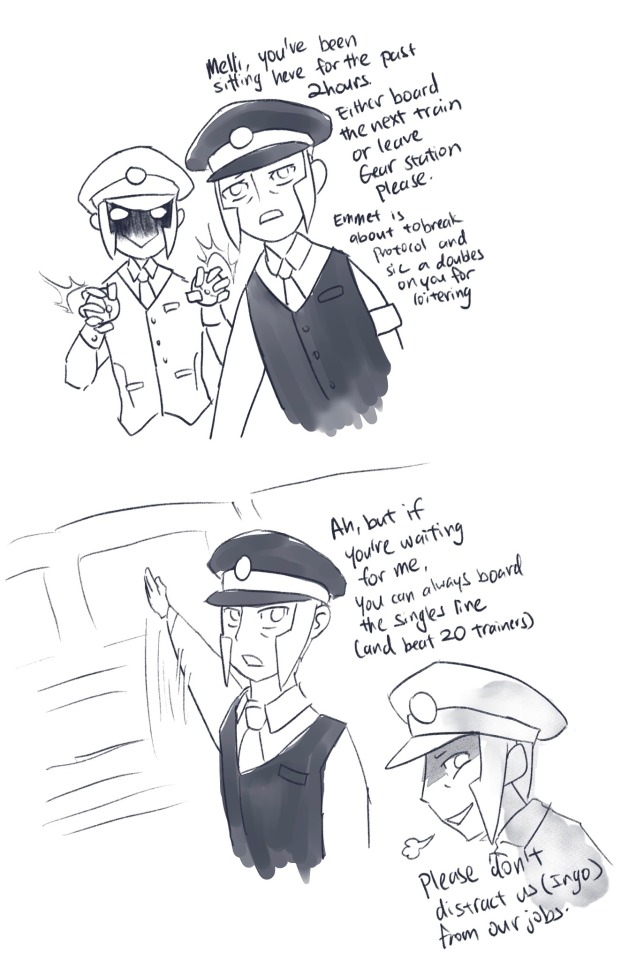
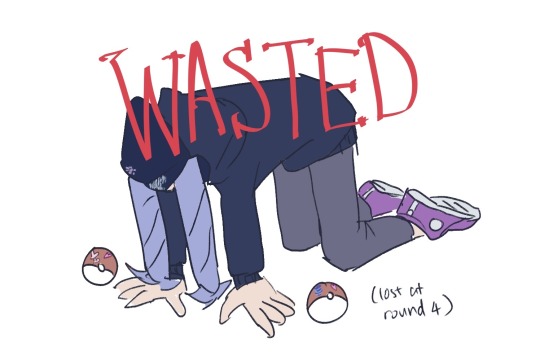
#submas#continuing the joke#I’m rly bad at battle frontier#distraction leads to safety incidents#this was a osha certified post
193 notes
·
View notes
Text
Tool Safety Series: Table Saws
Whether you're a professional woodworker or just a tool enthusiast, its never a bad idea to brush up on proper tool use and safety practices.
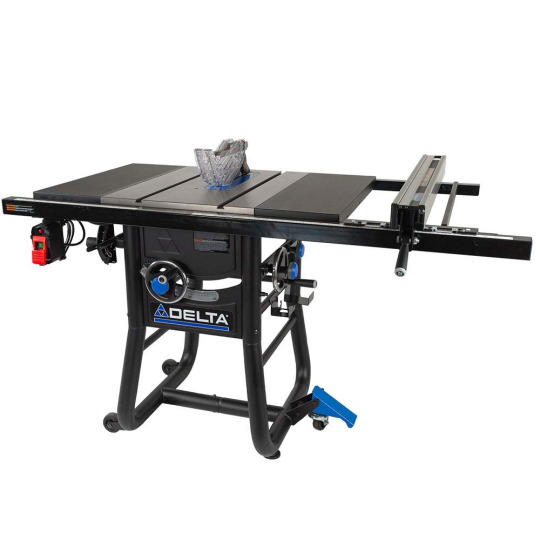

Pictured above are a contractor table saw (Left) and a cabinet maker table saw (Right). Despite their differences, the same standards and safety practices apply to both when hand feeding material.
Guard Requirements:
Blade guards
"Each circular hand-fed rip saw shall be provided with a hood-type guard that will cover the blade at all times when not in use. This may be accomplished by the use of a guard which will automatically adjust to the thickness of the material being cut, or by a fixed or manually adjusted guard"
"Each circular hand-fed rip saw shall be provided with a hood-type guard that will cover the blade at all times when not in use. This may be accomplished by the use of a guard which will automatically adjust to the thickness of the material being cut, or by a fixed or manually adjusted guard"

Above is an automatically adjusting hood-type guard which doubles as a dust extraction hood. These protect operators from small debris that may be thrown back during a rip cut such as dust, splinters, loose knots, and foreign materials such as nails. A guard like this required to be in place at all times if the cut being made allows it. The hood may be removed for special cuts that would otherwise be impossible with the hood in place.
Spreaders
"Each hand-fed circular saw shall be equipped with a spreader to minimize the possibility of material squeezing the saw"

Even the slightest horizontal force on a board in the middle of a cut can cause it to kickback at incredible speed. The spreader helps mitigate this hazard by providing a static surface for cut material to slide against.
These standards are established by ANSI O1.1-1961: Safety Code for Woodworking Machinery - Section 6.1 and are incorporated by reference by 29 CFR 1926.304(f).
General Operating Procedures:
Never start the saw if material is touching the blade. The blade needs time to accelerate to operational speed and will kickback anything touching it when it starts up.
Avoid standing behind the space between the blade and the fence. It is much easier for material in this area to kickback into an operator. When possible, it is safest to stand on the left-hand side of the saw blade. Keep a wide stable stance when hand feeding material and avoid bending or leaning as this may lead to falls.
Related to the previous point, always keep a hand/push-stick on the material between the blade and the fence. This where kickback is most likely to occur. Push-sticks should be used if making narrow cuts that could bring an operators hands close to the blade.
Never apply lateral or vertical force to material being cut. Material must only receive force from behind and above to keep it flat on the table top and moving smoothly forward. Be especially aware of this when cutting large sheets of material with a partner.
Use a roller stand or ask for assistance when cutting material that hangs off the edge of the table top. Hanging material may cantilever the rest of the material, causing it to lift off the table top and kickback.

In the picture above, the person in pink in assists the operator in blue. As the operator in blue pushes the sheet through the blade, the assistant keeps their hands on the material, slowly walking along side it. If they were to apply force in any direction (other than to counter gravity) it would almost certainly cause the saw blade to bite into the material and potentially kick it back in to the operator.
Due to the versatility of table saws, these guidelines are not exhaustive. Be sure to read the operators manual before operating machinery for the first time.
346 notes
·
View notes
Text
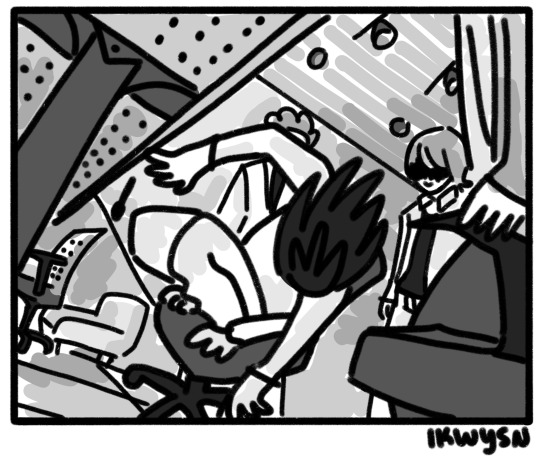
haha still drawing the guy :)

#death note#l lawliet#light yagami#manga panel redraw#ok there’s technically more than just them but idc#my art#if L followed osha safety in the workplace this wouldn’t be an issue smh#most low effort doodle i’ve done in a while#did not feel like drawing light’s face at the scale of brush i had chosen#so he gets no face#but that’s ok bc i said so :]
65 notes
·
View notes
Text
A 2nd Take on Rich People Magnet Danny
You know the canon. Vlad wants to kill Jack for the accident and wants to adopt Danny. Now here's the humorous take
Vlad isn't unique. Jack has many friends that are rich. Like Bruce Wayne and Lex Luthor. Or Namor and Victor Doom
Jack has also been careless and gotten them hurt too and they all want their pound of flesh
But unlike Vlad, they're satisfied with beating him up until they're tired or Jack is in a coma. Whichever happens first
And they all offer to take in Danny before attempting to beat Jack into a coma
Danny: Dad, is just something that happens to the both of us?
#Danny Fenton#Jack Fenton#billionaires#Jack Fenton is prone to causing accidents#Jack Fenton has no concept of lab safety#Jack Fenton hasn't heard of OSHA#Danny Phantom#dp
143 notes
·
View notes
Text
TMA but the archives crew are unionized. Discuss.
#“yeah im sorry the Horrors are a workplace safety violation im reparting you to british osha”#fandomposting#the magnus archives#tma
24 notes
·
View notes
Photo

1K notes
·
View notes
